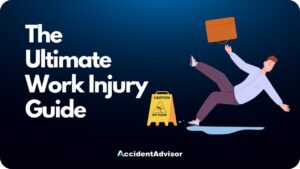A car accident is a serious event even if you don’t notice a serious injury at first. Whiplash can affect anyone differently and even become a debilitating chronic condition long after the crash. This is why getting a fair whiplash settlement relies on looking ahead and making a strong case for your future pain as well as your current injuries.
If you were in a car accident and are wondering how to get whiplash injury compensation, read this guide to figure out the steps you should take following your injury. The burden of proof relies on your side during a whiplash injury settlement, so you need to know the documents and procedures that will lead to your successful compensation.
As always, consulting an experienced personal injury and car crash attorney can help you navigate these steps and get the settlement you deserve.
Table of Contents
- What is Whiplash?
- Average settlements for whiplash claims
- Compensation for severe whiplash injuries
- How are Whiplash Damages Calculated?
- Whiplash Cause and Symptoms
- Whiplash grading system explained
- Tips to Increase Whiplash Injury Compensation
- Be Careful What You Say at the Scene
- Be Careful What You Do at the Scene
- Let Paramedics Evaluate You
- Gather Important Evidence
- Get a Full Medical Evaluation
- Choose Qualified Medical Professionals
- Only Sign a Limited Medical Release
- Obtain Documentation for Work Absences
- Keep an accident diary
- Consult a personal injury attorney
- Summary
What is Whiplash?
“Whiplash” is a commonly used accident injury term, but not everyone knows exactly what it means. You will need a more detailed understanding of whiplash if you hope to get fair whiplash injury compensation because you will need to explain it accurately to the insurance adjuster.
Whiplash is caused by damage to the neck resulting from a rapid movement forward and back (or back then forward). If you imagine the way that a whip snaps, consider that your spine cannot handle that movement without sustaining an injury.
Car accidents are the most common circumstances that cause whiplash, but they can also be caused by sudden movements in contact sports or by sustaining a bad fall.
Average settlements for whiplash claims
The amount of whiplash injury compensation you can expect depends on the severity of your injuries and the strength of your case. The average settlement range could be anywhere from $10,000 to $50,000 for minor injuries and as much as $5 million for injuries that are chronic or life-altering.
The more severe the injury, the more evidence is required to get a fair whiplash settlement. If your doctor confirms that you will need medical treatment for years or even the rest of your life, the estimated cost of your care in the long term will factor into your settlement amount.
Compensation for severe whiplash injuries
Your pain and suffering also factor into the letter you will write to the insurance adjuster with your demanded compensation amount. The settlement range that applies to you will depend on the severity of your injuries. This is why if you want more than the average settlement for whiplash injuries, you should seek the help of an experienced attorney, who can help you write persuasive demands.
For example, the Denis Law Group recently took a case where a whiplash victim was given a $20,000 offer. After the trial, the jury voted for $98,000 in compensation damages due to the firm’s presentation of the right evidence.
Whiplash compensation will not always be what the victim deserves. The insurance adjuster will use any means they can to prove that your injuries were not serious or that they were sustained later. Having an attorney on your side in a serious case could be the difference between an average settlement for whiplash injuries and the compensation you deserve.
How are Whiplash Damages Calculated?
Whiplash injury compensation is calculated as a combination of all the financial costs of being injured. These include the costs of doctor visits, surgeries and other treatments, therapy and rehabilitation, transportation costs, lost income, pain and suffering, mental trauma (including depression), and more.
Typically, to calculate a whiplash injury settlement, your attorney would tally up all the costs that can be documented and then multiply that number by a number from 1 to 5 to represent your pain and suffering. This includes not only your mental trauma and depression but also the strain on your relationship with family members and the toll on your work and love life.
Whiplash Cause and Symptoms
As mentioned, whiplash is caused by the neck being forced back and forth too hard. It is a common side effect of a car crash due to the sudden stop at the moment of the crash, though it can also be caused by other types of injuries such as those sustained in high-impact sports.
The most common symptoms of whiplash are:
- Neck and back pain
- Increased pain with neck movement
- Inability to move neck
- Headaches
- Upper back, shoulder, or arm pain
- Tingling or numbness in arms
- Fatigue
- Dizziness
Other symptoms that can be experienced include:
- Blurred vision
- Ringing of the ears
- Sleep problems
- Memory loss
- Difficulty concentrating
- Depression
Whiplash grading system explained
There are four grades of whiplash that are used to broadly describe how severe the injury is. This grade is a significant standardized metric that allows you to get a fair whiplash settlement since your doctor can “grade” your injury and the court will know officially how much damage you sustained.
Grade 0 is whiplash with no current physical signs. Grade 1 shows no physical signs, but the victim can feel it in their neck. Grade 2 begins to show signs in musculoskeletal workups as well as causing pain. Grade 3 is serious enough to cause identifiable neurological damage in addition to the victim’s complaints.
Tips to Increase Whiplash Injury Compensation
Whiplash compensation depends on the strength of your case. Even if you sustained serious injuries, you could receive a low whiplash injury settlement if you don’t follow the proper protocols.
These are the steps you should follow to ensure that you receive fair whiplash injury compensation:
Be Careful What You Say at the Scene
The insurance adjuster will review your behavior looking for inconsistencies, even immediately after the accident. Refrain from apologizing for the accident, suggesting that it was your fault, or downplaying your injuries. Insurance adjusters can nitpick everything you say following an accident, including using witness accounts to derail your injury claim.
Be Careful What You Do at the Scene
What you do can be just as important as what you say. If you do anything strenuous following the accident such as pushing a car out of the street, this could hurt your ability to make a successful injury claim. Make sure you and your passengers are safe, but after that, refrain from doing anything that could be interpreted as inconsistent with your injury claim.
Let Paramedics Evaluate You
Refusing to be treated by paramedics can hurt your injury claim because the insurance adjuster can claim that you were not injured by the crash. Even if you don’t feel the physical effects of the crash yet, you should always let the on-site paramedics check you out. Remember that conditions like whiplash often take a while to reveal themselves, so the way you feel immediately after the crash isn’t necessarily indicative of your condition.
Gather Important Evidence
So long as it doesn’t endanger you further, you should gather evidence at the scene that will help your case. This includes pictures and videos of the scene, property damage, skid marks, everyone’s contact information, and even incriminating statements from the other driver.
Get a Full Medical Evaluation
Getting a fair whiplash settlement relies on accurate records of your injuries. The emergency room is your best resource for this. Visit one as soon as possible so a medical professional can make an accurate assessment of your health. The documentation they provide will corroborate your reports of your pain with valid evidence.
Choose Qualified Medical Professionals
You cannot rely on secondary medical professionals to make a strong injury case. Chiropractors or masseuses may help you feel better, but they cannot accurately document your injuries. Make sure you see an emergency room doctor or primary care doctor as soon as possible, even if you see other professionals to aid in your recovery.
Only Sign a Limited Medical Release
Insurance companies do not have a right to receive your full private medical history. However, they may ask you to sign those records over to them so be careful and read everything before signing anything.
Obtain Documentation for Work Absences
To make sure that lost income is calculated as part of your compensation package, you’ll need to obtain a detailed record of absences from your place of work. Note that you should not continue performing a physically strenuous job if you hope to make a successful injury claim since the insurance adjuster will claim that your injuries aren’t that severe.
Keep an accident diary
An accident diary is an account in your words of what happened before, during, and after the accident. This can help your case because it allows the adjuster or jury to get a sense of your feelings, your actions, and the cost of the accident on your life. The pain and suffering multiplier, which is a significant factor in your settlement amount, is an abstract notion that requires unique evidence to validate. A genuine accident diary that keeps your thoughts and experiences well-documented could justify the multiplier you use.
Consult a personal injury attorney
A severe injury, which has documentable medical damage like Grade 2 and Grade 3 whiplash, could result in a significant financial settlement. However, the larger the potential settlement, the more the insurance company will pry into the case looking for inconsistencies in your actions and documentation. A personal injury attorney can help you navigate the above tips to make sure your actions work for your case rather than against it.
Summary
A fair whiplash settlement relies on a strong case. The tips above can help you convince the insurance adjuster or the jury to give you the whiplash injury compensation that you deserve for your injuries.
This means taking the right actions at the scene of the accident and in the months that follow, including seeing accredited medical professionals and keeping detailed records of your pain and suffering. Any costs that can be documented can strengthen your case for whiplash compensation.
An experienced personal injury attorney can help you navigate these steps to avoid costly mistakes that could ruin your chance of getting a fair whiplash settlement. However, whether you have a lawyer or not, you can use this guide to properly understand whiplash, navigate the settlement process, document your injury, and make a strong case with the insurance adjuster.

Rocky Horton
Author
Rocky Horton is a health and safety expert from Chapel Hill, NC. He is the founder of AccidentAdvisor and has been featured in Forbes, Bloomberg, and other publications. Learn more.













